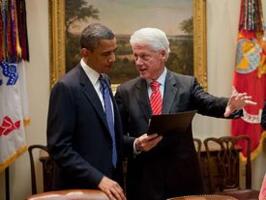47% Think It’s Negative To Compare A Candidate to Obama or George W. Bush
Comparing a candidate to President Obama is as bad these days as comparing one to George W. Bush as far as voters are concerned. For most voters, Ronald Reagan remains the best president of the last 30 years to compare a politician to.
A new Rasmussen Reports national telephone survey finds that 47% of Likely U.S. Voters consider it a negative to describe a candidate as being like Barack Obama. Just as many (48%) view a comparison to Bush as a negative.
For 29%, comparing a political candidate to Obama is a positive, while 19% consider it somewhere in between a positive and a negative. Similarly, 24% say describing a candidate as being like his Republican predecessor in the White House is a positive, while 26% think it’s somewhere in between. (To see survey question wording, click here.)
In January 2009 as Bush left office, 57% of Americans described him as one of the five worst presidents in U.S. history. By November 2010, 53% of voters rated him somewhere between one of the best and one of the worst.
But 52% of voters believe that describing a candidate as being like Reagan is a positive. Twenty-five percent (25%) view that as a negative description. Nineteen percent (19%) rate it as somewhere in between.
Fifty-one percent (51%) said comparing a candidate to Reagan was a positive in late August 2011, but that was the first time in surveys for several years that a majority of voters felt that way. Still, it’s always been best as far as voters are concerned to compare a candidate to the Republican who served in the White House from 1981 to 1989.
Bill Clinton also ranks higher in voters’ minds than the two men who followed him in the White House. Forty-one percent (41%) consider it a positive to compare a candidate to Clinton, while 31% say it’s a negative. For 26%, it’s somewhere in between the two.
Thirty-eight percent (38%) said in October 2011 that it was a positive to describe a political candidate as being like Clinton, the 42nd president of the United States from 1993 to 2001. Twenty-four percent (24%) saw that description as a negative, while 35% put it somewhere in between.
(Want a free daily e-mail update? If it's in the news, it's in our polls). Rasmussen Reports updates are also available on Twitter or Facebook.
The survey of 1,000 Likely Voters was conducted on November 23-24, 2013 by Rasmussen Reports. The margin of sampling error is +/- 3 percentage points with a 95% level of confidence. Field work for all Rasmussen Reports surveys is conducted by Pulse Opinion Research, LLC. See methodology.
Being described as a career politician is the worst, however. Just seven percent (7%) of voters consider that a positive description for a candidate. Fifty-three percent (53%) view it as a negative, up six points from 47% in August 2011. Thirty-six percent (36%) say it’s somewhere in between.
Interestingly, just 53% of Democrats now view it as a positive to compare a political candidate to Obama, while only 50% of Republicans feel that way about a comparison to Bush. By comparison, 72% of Democrats think describing a candidate as being like Clinton is a positive, and 85% of GOP voters say it’s a positive to compare a candidate to Reagan.
Among voters not affiliated with either of the major political parties, 51% say it’s a negative comparison to describe a candidate as being like Obama, while 43% feel that way about a comparison to Bush. Unaffiliated voters are almost evenly divided when asked about a comparison to Clinton, but 57% consider it a positive when a candidate is described as being like Reagan.
Seventy-two percent (72%) of the Political Class thinks a comparison to Obama is a positive one for a candidate, and slightly more (76%) say the same of a comparison to Clinton. But 77% of Political Class voters view a Bush comparison as a negative, and 62% think that it’s negative to say a candidate is like Reagan.
Mainstream voters are closely divided over a comparison to Clinton, but 56% think it’s a negative to describe a candidate as being like Obama. A plurality (42%) of those in the Mainstream agree that comparing a candidate to Bush is a negative, but 62% regard a comparison to Reagan as a positive.
Thirty-seven percent (37%) of all Americans said in February of last year that Ronald Reagan was the most influential president in the last 50 years. John F. Kennedy was a distant second with 21%, closely followed by Clinton who earned 19% support. Obama, however, was not included in that list.
Sixty-two percent (62%) of voters now believe that Clinton was a better president than fellow Democrat Obama.
As problems continue to surround the new national health care law, Obama’s daily job ratings remain at the lowest levels of his entire presidency.
Additional information from this survey and a full demographic breakdown are available to Platinum Members only.
Please sign up for the Rasmussen Reports daily e-mail update (it’s free) or follow us on Twitter or Facebook. Let us keep you up to date with the latest public.
The survey of 1,000 Likely Voters was conducted on November 23-24, 2013 by Rasmussen Reports. The margin of sampling error is +/- 3 percentage points with a 95% level of confidence. Field work for all Rasmussen Reports surveys is conducted by Pulse Opinion Research, LLC. See methodology.
Rasmussen Reports is a media company specializing in the collection, publication and distribution of public opinion information.
We conduct public opinion polls on a variety of topics to inform our audience on events in the news and other topics of interest. To ensure editorial control and independence, we pay for the polls ourselves and generate revenue through the sale of subscriptions, sponsorships, and advertising. Nightly polling on politics, business and lifestyle topics provides the content to update the Rasmussen Reports web site many times each day. If it's in the news, it's in our polls. Additionally, the data drives a daily update newsletter and various media outlets across the country.
Some information, including the Rasmussen Reports daily Presidential Tracking Poll and commentaries are available for free to the general public. Subscriptions are available for $4.95 a month or 34.95 a year that provide subscribers with exclusive access to more than 20 stories per week on upcoming elections, consumer confidence, and issues that affect us all. For those who are really into the numbers, Platinum Members can review demographic crosstabs and a full history of our data.
To learn more about our methodology, click here.




